Trump's hostile takeover of big law
Paul, Weiss's capitulation is bad news for the legal profession.
⚖️ 📝 ⚖️ With corporate outlets obeying in advance, supporting independent political media is more important right now than ever. Public Notice is possible thanks to paid subscribers. If you aren’t one already, please click the button below and become one to support our work. ⚖️ 📝 ⚖️
The law firm of Paul, Weiss, Rifkind, Wharton & Garrison (usually referred to just as Paul, Weiss) is the first to buckle in the face of an attack by Donald Trump, but it definitely will not be the last. The capitulation of one of the nation’s most prominent law firms is the worst sort of complying in advance, and its complete surrender immediately emboldened Trump to issue a new directive threatening any lawyer who sues the administration.
Broadly speaking, the firm, which had revenue last year of more than $2.6 billion, agreed to represent clients of any political affiliation and donate a staggering $40 million in pro bono work to support Trump’s agenda. If that sounds like giving Trump control over how the firm chooses its clients and what causes it supports, that’s because that’s exactly what it did.
Paul, Weiss agreed to these conditions to get Trump to rescind his executive order suspending security clearances for firm employees, restricting their access to federal buildings, and instructing agency heads to limit employee contact with the firm. Those restrictions would have seriously compromised the firm’s ability to handle cases related to government employees or government matters.
Like so many Trump communiques, the executive order itself is a lengthy screed that veers from complaining about the firm’s pro bono services to accusing it of discrimination to name-checking Robert Mueller, a person who in fact never worked there. Much of the order rails against two people who don’t work at Paul, Weiss any longer but whom Trump remains incandescently angry at: Marc Elias, who prevailed in 64 (out of 65!) cases related to Trump’s meritless challenges of the 2020 election, and Mark Pomerantz, a former partner at the firm who also worked at the Manhattan District Attorney’s Office and assisted on Trump’s hush money criminal case.
Yesterday, Paul, Weiss managing partner Brad Karp sent a firm-wide letter explaining why he chose to say uncle so swiftly. He explained that Trump’s EO functionally threatened Paul, Weiss’s clients with the loss of their government contracts and access to the government if they continued to use the firm. Karp said he initially hoped the legal industry would “rally to our side,” but that didn’t happen.
The firm at first planned to file a lawsuit challenging the executive order, as Perkins Coie did when Trump recently targeted that firm with a similar EO. Perkins Coie won a temporary restraining order (TRO) blocking much of the EO from taking effect, with the judge saying Trump’s order was probably unconstitutional. But didn’t deter Trump, who issued the executive order against Paul, Weiss three days after the Perkins Coie TRO was granted.
A note from Aaron: Working with brilliant contributors like Lisa takes resources. If you aren’t already a paid subscriber, please sign up to support our work.
Given that Paul, Weiss had been targeted in a manner similar to Perkins Coie, it’s not unreasonable to expect they would also have been granted a TRO had they chosen to sue. However, as Karp explained in his letter, even if the firm succeeded in getting the executive order enjoined, it wouldn’t have solved the core problem, which is that clients were already perceiving Paul, Weiss as “persona non grata” with the administration. So instead of suing, Bill Burck, a managing partner at Quinn Emanuel with deep conservative ties, negotiated the deal with the White House on behalf of Paul, Weiss.
Karp’s initial communication to employees, sent last Thursday night, was an extremely brief email that characterized knuckling under to Trump as actually “commitments reaffirmed.” The only attachment was the White House statement gloating over what the firm had agreed to.
Everything about this is so messy and hasty that it’s not even entirely clear what Paul, Weiss agreed to. The White House statement attached to the email sent by Karp says the firm “affirms its commitment to merit-based hiring” and would retain experts to have a “comprehensive audit” of employment practices. It makes no mention of Mark Pomerantz.
The version Trump posted, however, says that the firm “will not adopt, use, or pursue any DEl policies.” There’s also an entire paragraph about Pomerantz that doesn’t appear in the Paul, Weiss version: "The President is agreeing to this action in light of a meeting with Paul, Weiss Chairman, Brad Karp, during which Mr. Karp acknowledged the wrongdoing of former Paul, Weiss partner, Mark Pomerantz, the grave dangers of Weaponization, and the vital need to restore our System of Justice."
It certainly isn’t great that a major American law firm agreed to a deal so vague that the parties don’t even seem to agree on the terms. Paul, Weiss gave away its honor and autonomy for an agreement so broad and undefined it could have been sketched out on a napkin. Karp’s Sunday letter to the firm didn’t address the discrepancies at all, leaving everyone still wondering what, exactly, Paul, Weiss is doing.
Shakedown street
Paul, Weiss's complete and immediate capitulation feels like Columbia University’s decision to cave into all the administration’s demands, which we detailed here in Public Notice last week.
Just as Columbia’s surrender paved the way for Trump to increase his attacks on higher education, Paul, Weiss’s collapse no doubt led to Trump’s Saturday memo targeting the entire legal profession.
It’s impossible to overstate the grimness of this document, titled “Preventing Abuses of the Legal System and the Federal Court.” As Chris Geidner characterized it on Bluesky, “It's basically a catch-all ‘let's Paul Weiss whoever pisses us off’ memo.” It takes particular aim at immigration attorneys, accusing them of coaching clients to lie and tying them to “heinous crimes against innocent victims” and “mass illegal immigration.”
The memo also directs Attorney General Pam Bondi to seek court sanctions against attorneys who engage in “frivolous, unreasonable, and vexatious litigation” against the government. Of course, only the administration gets to determine if a lawsuit is frivolous, unreasonable, or vexatious, a big problem when Trump believes any lawsuit against him is meritless. This threat of sanctions will no doubt deter some attorneys from bringing actions against the government.
Bondi will also review all lawsuits against the government over the past eight years. If she identifies attorney misconduct, she can recommend additional steps to Trump, such as yanking security clearances.
The memo directs Bondi to refer lawyers for disciplinary action if they violate professional conduct rules, including rules about meritless claims. So, if Trump or Bondi thinks a lawsuit against the government has no merit, a determination not governed by anything except Trump’s whims, the attorney will get reported to the bar. Oh, and fun fact: Bondi’s brother is currently running for president of the Washington DC bar association, which oversees disciplinary actions.
The blanket accusations of unethical behavior and the threat of sanctions are especially rich coming from Trump, given that many of the attorneys who represented him in his actually frivolous lawsuits challenging the 2020 election have been sanctioned.
Sidney Powell and Lin Wood were sanctioned over a baseless lawsuit in Michigan trying to reverse that state’s election results. Powell and Wood appealed all the way to the US Supreme Court, which declined to take up the case and left the sanctions in place. Multiple attorneys who represented Trump in his New York state criminal case were sanctioned for making frivolous motions, including bringing forward the same argument the judge had already rejected twice.
Rudy Guiliani is permanently disbarred in DC. The DC bar also recommended a two-year suspension for former Assistant Attorney General Jeff Clark. Kenneth Chesbro, one of the architects of the fake elector scheme, is indefinitely suspended from practicing law in New York. Jenna Ellis agreed to a three-year suspension in Colorado after she’d already been censured for making false statements about the election.
It’s not just Trump’s 2020 election fraud attorneys who have problems with unethical behavior. Current DOJ attorneys have pulled stunts such as refusing to provide answers about the deportation of migrants to a slave prison in El Salvador after defying a court order to turn the planes around. In that same case, DOJ attorneys argued that verbal orders are not the same as written ones and they weren’t obliged to follow them — a claim that surely came as big news to every judge.
Or consider the lawsuit brought by Climate United over the administration’s freezing of its funds, There, DOJ attorneys asked the plaintiff’s counsel for a 24-hour delay of the TRO hearing. After Climate United’s attorneys agreed, the administration immediately terminated the group’s funding, then filed papers with the court smugly declaring there was no reason for a hearing because Climate United now had no funds and therefore nothing to unfreeze.
But guess who hasn’t faced a barrage of sanctions and ethical complaints? The lawyers who pushed back against the tide of frivolous lawsuits contesting the results of the 2020 election, and the lawyers who work to protect immigrants. Trump’s memo is from an upside-down world where those lawyers are unethical, while the crooked attorneys he has surrounded himself with are paragons of virtue.
Trump’s memo is a comprehensive attack on the legal profession, a not-even-veiled threat to any firm that would bring a lawsuit against the government. The logical outcome of making firms gun shy is that parties affected by his teardown of democracy will have no one to represent them. It’s another way Trump is working to ensure that nothing will stop him.
Paul, Weiss’s agreement to provide tens of millions of dollars of free labor to the administration inevitably makes them collaborators in Trump’s agenda and compromises the firm's integrity. It also puts them in the same position as Columbia, constantly needing the administration’s approval to stave off new shakedowns. But the administration, like any bully, will keep attacking, will keep changing the terms, and no acquiescence will ever be sufficient. That’s exactly why bending the knee is such a bad idea.
That’s it for today
We’ll be back with more tomorrow. If you appreciate today’s newsletter, please support our work by signing up. Paid subscribers make PN possible.
Thanks for reading.

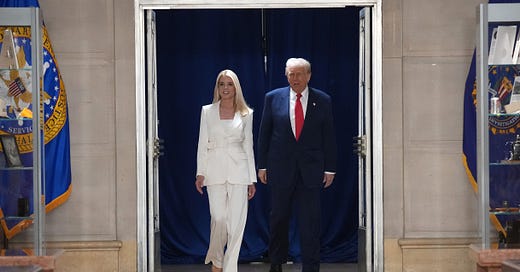



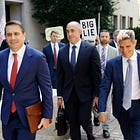
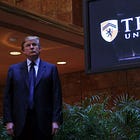

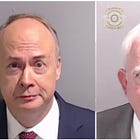
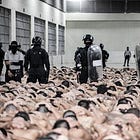
Anyone who cares about this issue should read about, respect and honor Rachel Cohen the embodiment of the Fearless Girl (which, coincidentally, also "needed" to be removed): https://democracychronicles.org/fearless-girl-statue/
Rachel Cohen, a 2022 graduate of Harvard Law School and former third-year associate at Skadden Arps, is awesome. She certainly foresaw how Skadden (and others in the legal community) would react, and she made an intelligent, courageous stand on principle that led by example and cost her quite a lot. The legal profession should do what it can to support her stand, even if they dare to do so only from behind the scenes.
As David Lat of Original Jurisdiction and Judicial Notice put it, Ms. Cohen led the profession in integrity and courage:
putting together an open letter from Biglaw associates, which denounced the Trump administration’s “all-out attack aimed at dismantling rule-of-law norms.” As of last weekend’s Judicial Notice, the letter had 300 signatures from Biglaw associates; today, the number exceeds 1,350. She also penned an opinion piece for Law360, Firms Must Speak Up After Trump Orders: An Associate’s View, claiming that Trump’s attack on Biglaw has given risen to “the most urgent moment for the legal industry in our lifetimes. How we answer it will haunt us or be a point of pride. Let it be the latter.”
After news of the Paul Weiss deal broke, Cohen kicked it up a notch, in a firmwide email she sent to everyone at Skadden:
Please consider this email my two-week notice, revocable if the firm comes up with a satisfactory response to the current moment, which should include at minimum (i) signing on to the firm amicus brief in support of Perkins Coie in its litigation fighting the Trump administration’s executive order against it, (ii) committing to broad future representation, regardless of whether powerful people view it as adverse to them, (iii) refusal to cooperate with the EEOC’s request for personal information of our colleagues clearly targeted at intimidating non-white employees, (iv) public refusal to fire or otherwise force out employees at the Trump administration’s directive or implied directive and (v) public commitment to maintenance of affinity groups and related initiatives.
This is not what I saw for my career or for my evening, but Paul Weiss’ decision to cave to the Trump administration on DEI, representation and staffing has forced my hand. We do not have time. It is now or it is never, and if it is never, I will not continue to work here.
The fact that this firm gave in, rolled over and is playing dead so quickly is frightening and displays the vindictiveness of this administration. Will the courts be able to keep them in check, and will the Democrats be able to regain leadership in the house and possibly the senate? Depending on who I listen to, some say that we have no chance in possibly ever regaining the senate given the strength of the opposition- I am holding to my belief that by next year so many of the current Trump supporters will have suffered to the point that they will be open to a different choice!